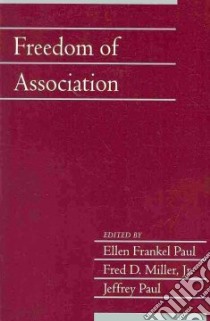Freedom of Association - 9780521732284
Un libro in lingua di Paul Ellen Frankel (EDT) Miller Fred D. Jr. (EDT) Paul Jeffrey (EDT) edito da Cambridge Univ Pr, 2009
- € 36.10
- Il prezzo è variabile in funzione del cambio della valuta d’origine
Freedom of association is a cherished liberal value, both for classical liberals who are generally antagonistic toward government interference in the choices made by individuals, and for contemporary liberals who are more sanguine about the role of government. However, there are fundamental differences between the two viewpoints in the status that they afford to associational freedom. While classical liberals ground their support for freedom of association on the core notion of individual liberty, contemporary liberals usually conceive of freedom of association as one among many values that are necessary for a liberal democracy to flourish. Which position provides a better grounding for freedom of association? Is liberal democracy the core value, or does a liberal democracy become defensible to the extent that it protects the core value of individual freedom? The twelve essays in this volume explore the history and development of the right of free association, and discuss the limits that may legitimately be placed on this right. Some essays address the constitutional status of freedom of association in the United States, exploring a range of legal decisions on association handed down by various courts, especially the Supreme Court. Some look at freedom of association in the context of unionization, or university policies on military recruiting, or the treatment of subversive organizations. Other essays examine the tension between the right of individuals to associate and the interest of government in preventing discrimination against members of disadvantaged groups. Still others address the views of particular political theorists who have influenced the debate on associational freedom, theorists such as John Locke, James Madison, Alexis de Tocqueville, and John Rawls.
Informazioni bibliografiche
- Titolo del Libro in lingua: Freedom of Association
- Lingua: English
- Autori : Paul Ellen Frankel (EDT) Miller Fred D. Jr. (EDT) Paul Jeffrey (EDT)
- Editore: Cambridge Univ Pr
- Collana: (Paperback)
- Data di Pubblicazione: 31 Gennaio '09
- Genere: BUSINESS and ECONOMICS
- Argomenti : Liberty Freedom of association Liberalism
- Pagine: 320
- Dimensioni mm: 222 x 146 x 12
- ISBN-10: 052173228X
- EAN-13: 9780521732284


